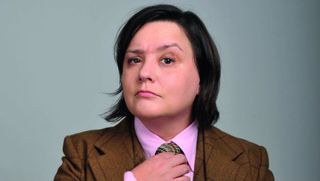My Favourite Game: Susan Calman

Susan Calman is a Scottish comedian, writer and actor who regularly guests as a panellist on BBC Radio 4 shows including The News Quiz and The Unbelievable Truth. In 2007, she won a BAFTA as part of the cast of Channel 4 sketch show Blowout, while 2013 saw the debut of her first solo series, Susan Calman Is Convicted, on Radio 4. Throughout all of this, she’s remained a passionate advocate for videogames.
In 2011, you said on Radio 4’s Dilemma that when you’re driving you sometimes pretend to shoot people at traffic lights as if you’re in Grand Theft Auto. Have you retained that habit?
[Laughs] Sometimes, yes! It’s the argument against videogames, I realise, that videogames are terrible because they increase violence. Well, no – it’s just fun sometimes. It’s just fun, I think, to shoot people at the traffic lights.
Do you remember your earliest gaming experience, drive-by or otherwise?
We had an Atari console and I remember my first experience was watching my brother play Indiana Jones. We had a BBC as well, so basically Chuckie Egg and those kinds of games. Probably because my big brother was playing them, I thought games were really cool. And then the first console I got was an N64. After that, I decided to get a PlayStation, because I had an American flatmate at the time who told me Resident Evil was the best game ever. So we used to rent Resident Evil from Blockbuster, then from the Friday until the Monday morning we would play it, and then I’d give it back and then rent it again. We should have just bought it! And from then on I’ve been a PlayStation girl, to be honest.
Is your wife interested in videogames?
Well, one of the reasons that it works is that she is more of a gamer than I am. I’m not in the house very much and sometimes I’m not even out the door before I hear the PlayStation going on. I remember some of our first dates [when] we were just sitting and playing games.
How about the people you work with? Most News Quiz panellists don’t come across as gaming-savvy.
That might be something you could say, yes! I mean, a lot of comics of my generation play games, and sometimes I’ll speak to [News Quiz presenter] Sandi Toksvig about it, but she has no interest at all in gaming. You know, I try to explain to her that to me it’s a bigger issue than gaming: it’s the art direction, it’s the music, it’s the expression. And there’s a huge amount of controversy about women in gaming, but younger people come to my shows and stuff and I say I think it’s a great thing for women to get into – not just in gaming terms, but in storylining, art direction, music. It’s a bigger industry than just some guys in their pants shooting things.
So you’re something of an evangelist?
I try to say to people, “Have you seen The Last Of Us? Have you seen some of these other games?” It’s much more than [shooting]. It’s much more than what you might think gaming is. So, I do try!
Have any of the games you’ve played done a good job of representing women, or alternative sexualities?
Well, the alternative sexuality thing is another debate, which is an interesting one. It’s a diversity issue, rather than just a sexuality or gender one, and my view has always been that games are rubbish at it. But then so is television and film, you know? If you watch Ripper Street, which is an interesting show, women are slapped every five seconds for some unknown reason, but I don’t turn my back on film or TV. I think the problem is that if you try to look at alternative sexualities to a be a representation of LGBT people in games, it’s just not happening yet. I mean, there’s no question that the game industry is really far behind anywhere else in that regard, but at the same time to me it’s not about having a lesbian hero, it’s just about having a woman who has genuine and understandable complex feelings.
Sign up to the 12DOVE Newsletter
Weekly digests, tales from the communities you love, and more
What’s your favourite game?
Now, I love all the games I know people are going to shout that I should love, but in terms of the excitement that I felt when I first played it, it would probably be Arkham Asylum. Now, there’s lots of others, believe me, but genuinely, while it has faults and it’s repetitive and the combat system is problematic and everything else, I loved it.
Edge magazine was launched in 1993 with a mission to dig deep into the inner workings of the international videogame industry, quickly building a reputation for next-level analysis, features, interviews and reviews that holds fast nearly 30 years on.
Most Popular


